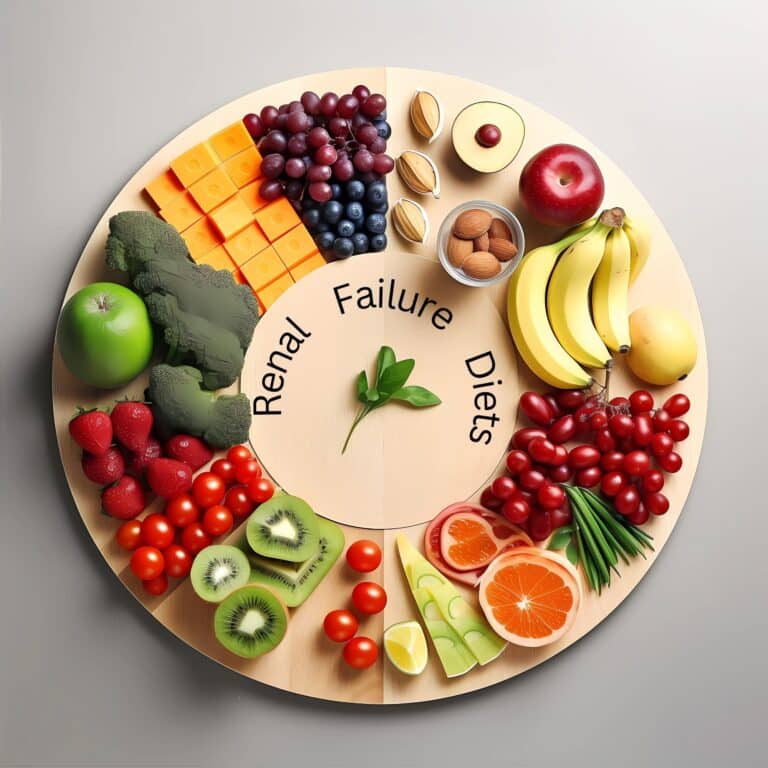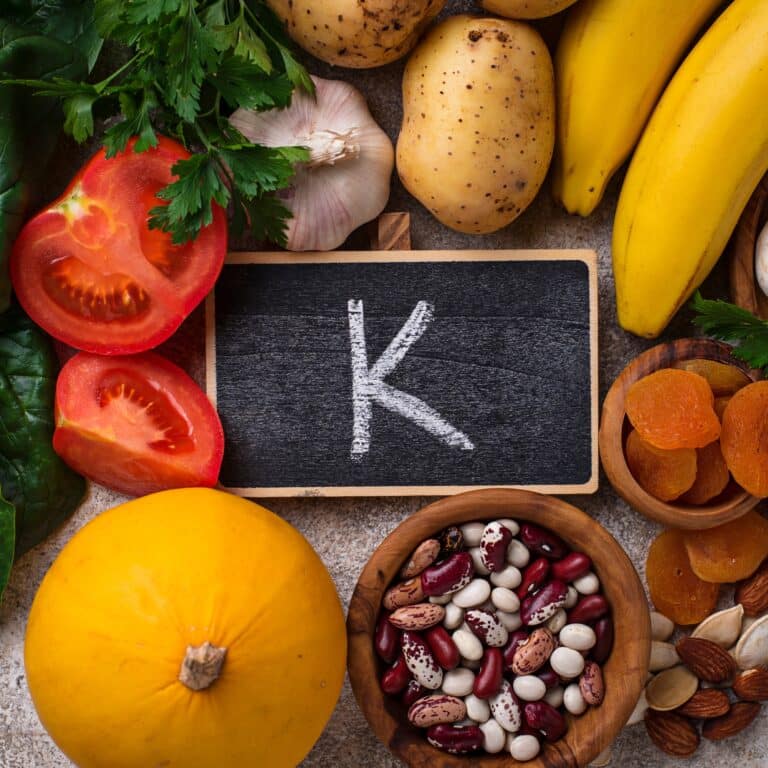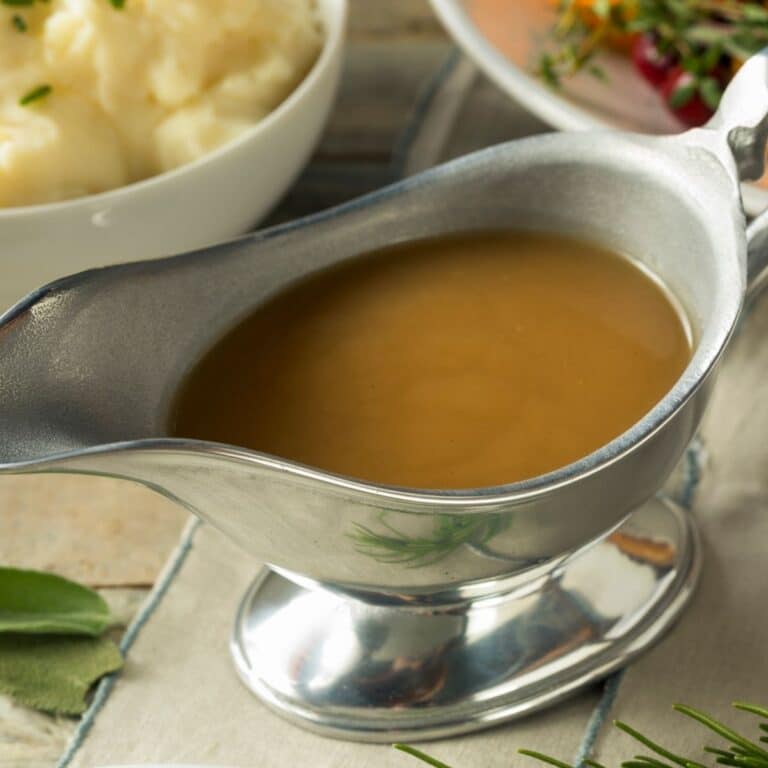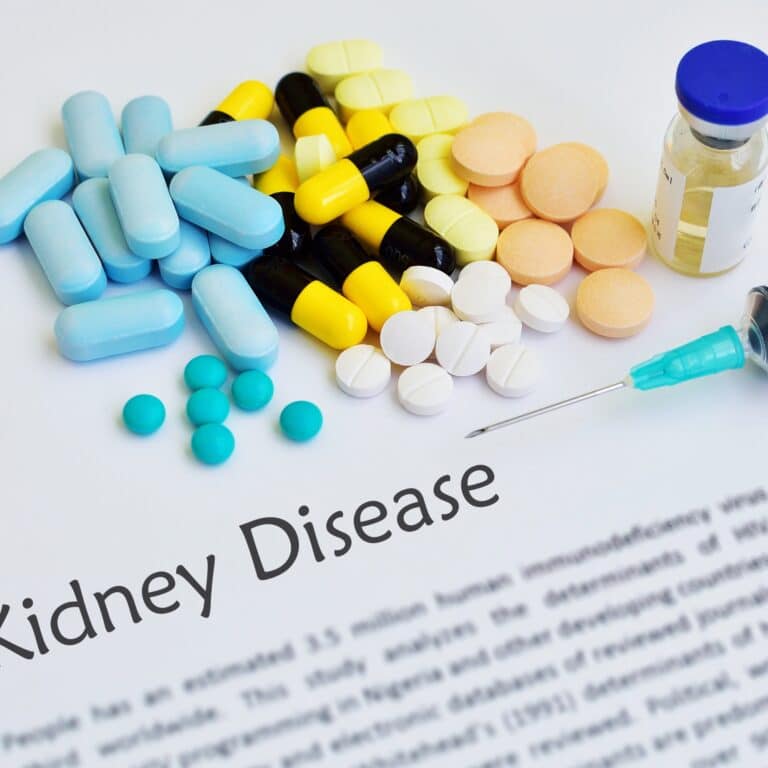Protein for CKD Patients: Stage By Stage
There are many parts of living with chronic illness that can be confusing. Navigating what you can and cannot eat, for example, can be a big challenge to overcome when trying to understand your life with chronic kidney disease (CKD). Some restrictions are discussed more than others, and some only apply during particular stages of illness.
Protein restrictions are one of those rules that many patients get tripped up on. Some kidney disease patients are told to carefully monitor or even restrict protein intake, while others may have never heard of protein being a problem.
It is important to understand that just like each person is an individual, so are their particular cases when it comes to chronic illness. No two people will be exactly alike, and therefore they may have different recommendations and restrictions for their health.
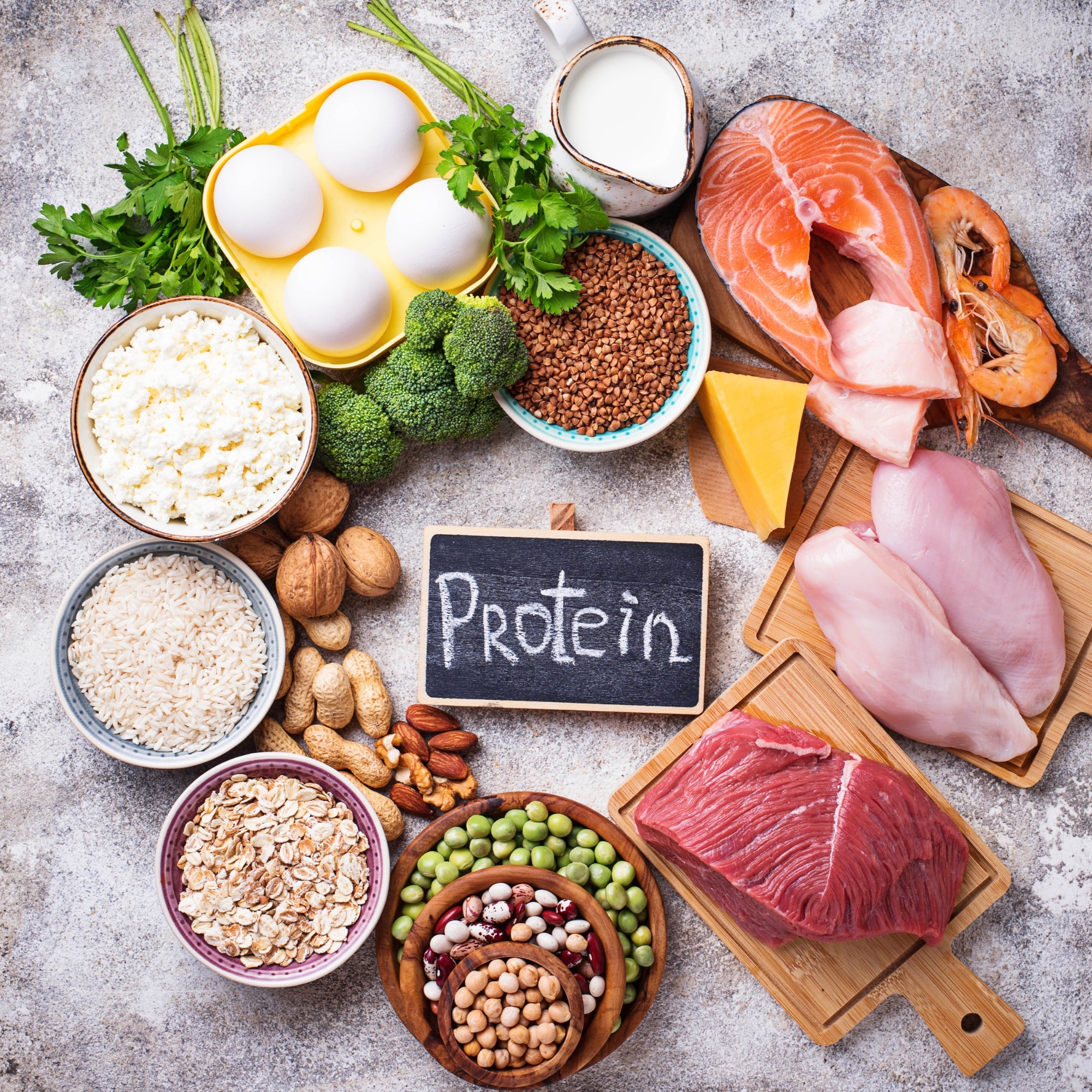
To get a better understanding of your own condition and how to monitor your own restrictions and recommendations, talk to your healthcare provider for specifics about your kidney disease and how to manage it.
In this article, we'll delve into how CKD affects protein needs, stage by stage.
Jump to:
- Key Takeaways
- The Role of Protein in the Body
- Protein Recommendations for Healthy Individuals
- Understanding Chronic Kidney Disease (CKD) and Protein
- Adapting Your Diet: Protein Intake in Early Stages of CKD
- Managing Protein Intake in Advanced Stages of CKD
- Protein Intake Changes for End Stage Renal Disease
- Protein Sources and CKD: What You Need to Know
- Dangers of Overconsumption or Underconsumption of Protein in CKD Patients
- Sample Meal Plan
- Frequently Asked Questions
- Protein Needs Vary By Stage of Kidney Disease
Key Takeaways
- Chronic kidney disease patients should limit their protein intake to prevent further kidney damage.
- High-bioavailability proteins like eggs and milk are recommended for CKD patients.
- Plant proteins like lentils, beans, and tofu are good alternatives for CKD patients with protein intolerance.
- Adequate protein consumption is crucial for maintaining muscle health and preventing muscle wasting in CKD patients.
The Role of Protein in the Body
Proteins are essential for various critical functions in the body, including muscle function and immune system support:
Muscle Function: Proteins play a central role in muscle function. Two key proteins involved in muscle contraction are actin and myosin. They interact to generate the force and movement required for activities such as walking, running, and lifting.
Adequate protein intake is crucial for maintaining skeletal muscle mass and strength, which is particularly important for physical performance and overall mobility, especially as we age.
Immune System Support: Proteins are vital for a healthy immune system. Antibodies, which are specialized proteins, act as the body's defense against pathogens like bacteria and viruses.
They recognize and neutralize these invaders, playing a critical role in immune defense. Additionally, some immune cells, like white blood cells, rely on proteins to function effectively in detecting and combating infections.
Other Roles: Proteins participate in an array of critical functions:
- Enzymes: Many proteins act as catalysts for biochemical reactions, ensuring efficient processes like digestion and metabolism.
- Hormones: Some hormones, such as insulin, are proteins that regulate various physiological processes.
- Structural Support: Proteins like collagen provide structural integrity to tissues, skin, and bones.
- Transport: Hemoglobin, a protein, transports oxygen in the blood.
- Enzyme Regulation: Certain proteins function as regulators, controlling enzyme activity and gene expression.
- Cell Signaling: Signaling proteins transmit messages within and between cells, orchestrating processes like cell growth and differentiation.
In essence, proteins are versatile and essential components in the body, contributing to muscle strength, immune defense, enzymatic reactions, structural support, and various other biological functions crucial for overall health and well-being. Maintaining an adequate protein intake through a balanced diet is vital to support these roles effectively.
For More Recipes and Ideas --->> Get Your Free Meals and Recipes That Are Perfect for Pre-Dialysis Diets, Pre-Dialysis with Diabetes, or Dialysis Diets.
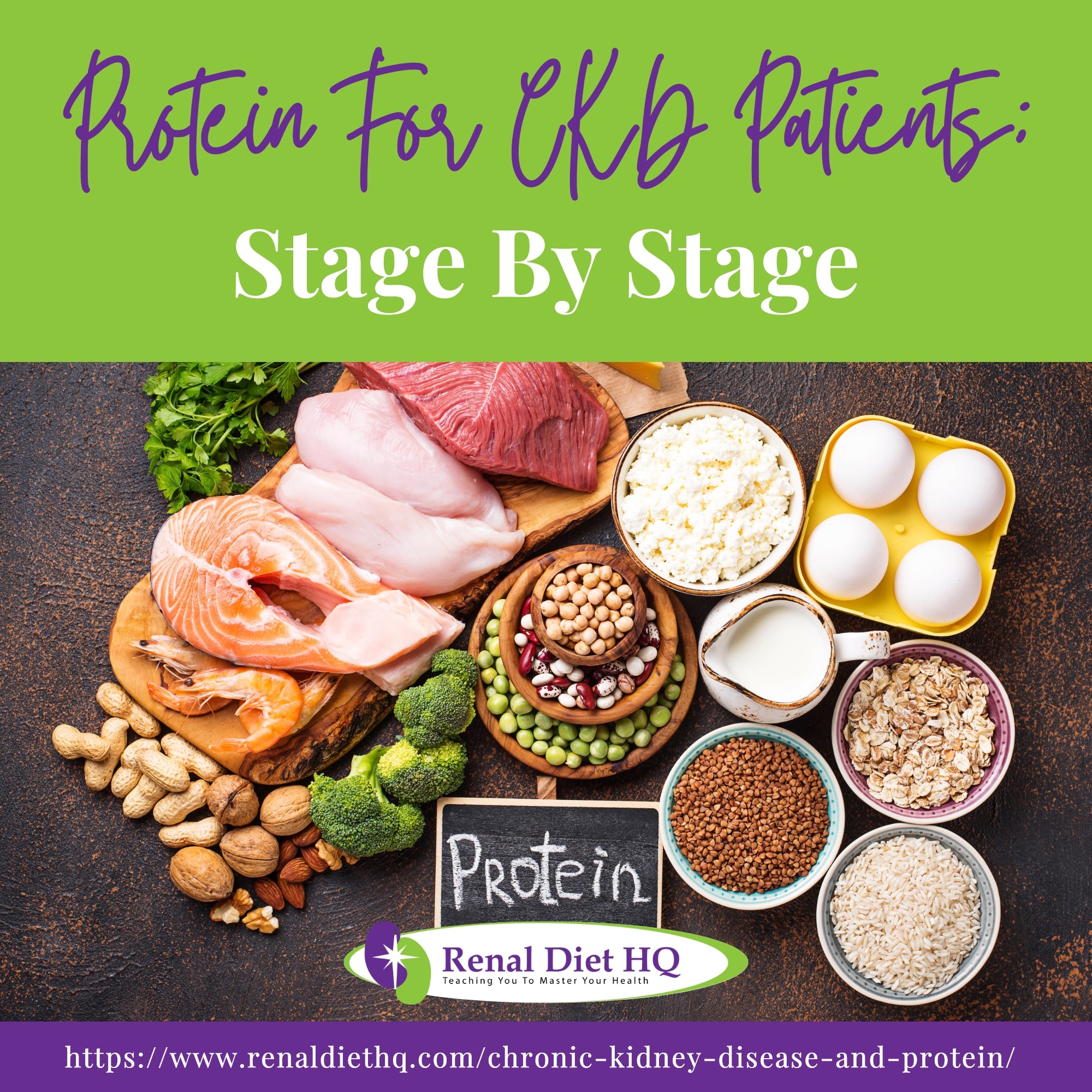
Protein Recommendations for Healthy Individuals
How much protein in CKD Diets? Understanding protein recommendations is key to maintaining good health. Proteins are essential for a variety of bodily functions, from building and repairing tissues to supporting the immune system and enabling enzymatic reactions.
In this section, we'll explore protein guidelines for healthy individuals, shedding light on how much protein you need, its sources, and the importance of balancing your diet to ensure you're getting the right amount of this essential nutrient for your overall well-being.
Daily Protein Intake
The Recommended Dietary Allowance (RDA) serves as a guideline for maintaining basic nutritional requirements, including protein intake. For healthy adults, the RDA for protein is typically set at 0.8 grams per kilogram of body weight, which is approximately 0.36 grams per pound.
In essence, this represents the minimum amount necessary to maintain good nutritional status and keep overall health good.
However, it's important to note that individual protein needs can vary based on factors such as age, activity level, and overall health. Athletes, for instance, often require more protein to support muscle growth and repair. Pregnant or breastfeeding women also need additional protein to support the growth and development of the fetus or infant.
Meeting your daily protein requirements is crucial as proteins play a pivotal role in various bodily functions, including tissue repair, immune support, and enzyme function.
Therefore, while the RDA serves as a baseline, it's essential to consider your unique circumstances and consult with a healthcare professional or registered dietitian to determine your specific protein needs for optimal health.
Protein Sources Variety
Incorporating a variety of protein sources into your diet is essential for maintaining optimal health and nutritional status. Different protein sources offer unique combinations of essential amino acids, vitamins, minerals, and other nutrients, contributing to a well-rounded and balanced diet.
By diversifying your protein intake, you ensure that you obtain a wide range of nutrients that support various bodily functions. For example, animal sources like lean meats, poultry, and fish provide high-quality protein with ample B vitamins and minerals like iron and zinc.
Are kidney beans good for kidneys? On the other hand, plant-based sources like beans, lentils, nuts, and seeds offer fiber, antioxidants, and heart-healthy fats in addition to protein.
Moreover, varying your protein sources can help you reduce the risk of dietary monotony and boredom, making it easier to maintain a nutritious and enjoyable eating habit.
A diverse protein intake not only supports overall health but also enhances the flavors and textures of your meals, promoting a sustainable and balanced approach to nutrition.
Understanding Chronic Kidney Disease (CKD) and Protein
Protein intake plays a crucial role in our diets, but in the context of Chronic Kidney Disease, the relationship between protein and health becomes more complex.
Let's dig into the intricate interplay between protein and CKD, exploring how protein affects kidney function and how CKD, in turn, can impact your protein requirements.
Understanding this dynamic interaction is essential for individuals managing CKD, as it can greatly influence their dietary decisions and overall well-being.
CKD Impact on Protein
Chronic Kidney Disease can significantly affect protein intake and utilization in several ways. As CKD progresses, the kidneys' ability to filter nitrogen waste products and excess protein from the blood diminishes.
This can lead to a buildup of waste products in the body, including blood urea nitrogen and serum creatinine levels, which are byproducts of protein metabolism.
To manage these elevated waste levels, healthcare professionals may recommend reducing protein intake, particularly high-protein foods like meat, poultry, and dairy products. Restricting protein can help alleviate the workload on the kidneys and slow down the progression of CKD.
Impact of Protein on CKD
Why low protein diet in kidney disease? Conversely, protein intake can impact chronic kidney disease progression and management. While limiting protein is crucial in later stages of CKD, ensuring adequate but not excessive protein intake in earlier stages is essential.
Protein is necessary for maintaining skeletal muscle mass, immune function, and overall health. For individuals with CKD, striking the right balance is key, as too little protein can lead to malnutrition, while excessive protein may strain the kidneys.
CKD and protein intake have a complex relationship. Tailoring protein intake to the specific stage of CKD is essential, and it often requires guidance from healthcare professionals and registered dietitians to strike the right balance. Proper protein management can help preserve kidney function, maintain overall health, and improve the quality of life for individuals living with CKD.
Adapting Your Diet: Protein Intake in Early Stages of CKD
In the early stages of Chronic Kidney Disease, managing protein intake takes on a crucial role. Finding the right balance between obtaining enough protein for overall health and reducing strain on the kidneys is essential.
This section delves into the specifics of protein intake during the early stages of CKD, offering insights and guidance on how individuals can make informed dietary choices to support their kidney health and overall well-being.
Early CKD: Protein Adjustments
Early-stage Chronic Kidney Disease (CKD) encompasses stages 1 and 2, where kidney function is mildly to moderately impaired. For patients with stage 1 CKD, the kidneys may have minor damage, for patients with stage 2, there is a slight decrease in filtration capacity.
During these stages, dietary protein intake considerations aim to strike a balance between maintaining overall health and supporting kidney function.
Protein intake limits in early CKD are often less restrictive than in later stages. The general recommendation is to consume a moderate amount of protein from high-quality sources, as protein remains essential for muscle maintenance and overall health.
Typically, it is advised to follow dietary guidelines that suggest consuming about 0.8 grams of protein per kilogram of body weight per day for patients with Early CKD.
However, dietary protein intake should be personalized based on factors like age, physical activity level, and individual nutritional requirements.
Regular monitoring of kidney function and consultation with a healthcare professional or registered dietitian are essential to ensure that protein intake aligns with the specific needs of the individual and the stage of CKD.
Kidney-Friendly Protein Sources In Early CKD
Early Chronic Kidney Disease necessitates careful dietary choices to manage kidney function and maintain overall health. Opting for kidney-friendly protein sources is vital. Foods like fish, lean poultry, and egg whites (can you eat eggs on a renal diet?) are excellent choices as they provide high-quality protein with minimal nitrogen waste products that can burden the kidneys.
Plant-based options, such as legumes, tofu, and low-potassium nuts, offer protein without causing excessive strain on the kidneys. Dairy products can also be included, but it's essential to select low-fat or fat-free options to limit phosphorus intake, a common concern in CKD.
Portion control (renal diet meat portion control) is crucial to prevent overloading the kidneys with protein. Consulting a dietitian can provide personalized guidance to ensure that dietary protein intake supports the body's needs while preserving kidney function in early CKD.
Managing Protein Intake in Advanced Stages of CKD
As your kidney disease progresses into the advanced stages, it's crucial to understand the necessity of protein restriction to safeguard your renal health.
Protein Restriction Necessity
Dietary protein restriction is a critical dietary component in managing Chronic Kidney Disease because it helps to slow down the chronic kidney disease progression and minimize the burden on these vital organs.
While protein is essential for the body, excessive consumption can lead to higher levels of protein waste products like urea and creatinine, which can be challenging for damaged kidneys to filter and eliminate.
Research has shown that dietary protein restriction to around 0.55-0.60 grams per kilogram of body weight can help delay the decline in kidney function. This controlled dietary intake reduces the accumulation of protein waste products, ultimately lessening the workload on the kidneys.
Additionally, it can help manage other complications associated with CKD, such as high blood pressure and proteinuria (excess protein in the urine).
However, it's important to strike a balance because too much dietary protein restriction can lead to malnutrition and muscle wasting. Therefore, personalized dietary plans, ideally crafted with the guidance of a healthcare professional or dietitian, are essential to ensure that individuals with CKD receive adequate nutrition while effectively managing their kidney health.
Regular monitoring of kidney function and dietary adjustments are crucial to adapt to changing needs over time. If you ever have questions, feel free to check out the ckd diet guidelines.
Dietary Management Strategies
Dietary management for chronic kidney disease patients focuses on controlling dietary intake of protein to preserve renal function. A critical aspect is consulting a registered dietitian experienced in CKD management who can provide personalized guidance.
They will help patients choose high-quality protein sources like lean fish, poultry, and egg whites while avoiding excessive phosphorus and potassium-rich foods.
Monitoring portion control for CKD patients is essential to meet protein restrictions, and overall nutrient balance should be maintained to prevent malnutrition. Patients with stage 4-5 kidney disease may need to supplement their diet with essential vitamins and minerals if necessary.
Regular monitoring and adjustments in collaboration with healthcare professionals are key to successful dietary management in CKD patients.
Protein Intake Changes for End Stage Renal Disease
Understanding the nuances of protein intake is paramount in the management of End Stage Renal Disease (ESRD). As renal function declines, dietary adjustments become increasingly critical.
This section explores the dynamic landscape of protein intake changes for individuals grappling with ESRD, shedding light on the intricate balance required to sustain health while mitigating the challenges posed by this advanced stage of kidney disease. You can avoid end stage renal disease with the right tools.
Kidney Failure Protein Needs
Dialysis patients with stage 5 CKD or kidney failure face unique challenges when it comes to their dietary protein needs. Both peritoneal dialysis and hemodialysis are highly effective at removing nitrogen waste products, including urea and creatinine, from the blood.
However, this process also results in the loss of essential nutrients, particularly protein. As a result, patients undergoing dialysis often require an increased protein intake to compensate for these losses and maintain their overall health.
Dietary protein intake in the range of 1.0–1.2 grams per kilogram of body weight per day is recommended for dialysis patients. This elevated protein intake serves several crucial purposes. First, it helps prevent malnutrition and muscle wasting, common concerns in this patient population.
Second, it supports the body's healing and immune function, which may be compromised in individuals with chronic kidney disease. Finally, adequate protein intake aids in maintaining a stable body weight and energy levels.
Balancing protein intake in dialysis patients is a delicate act, as excessive protein can lead to increased nitrogen waste product accumulation and strain on the kidneys.
Therefore, regular monitoring and personalized dietary plans, often under the guidance of a registered dietitian, are essential to ensure that the protein needs of dialysis patients are met while managing the unique challenges posed by their treatment. You can check out this healthy eating with a dialysis diet plan.
How To Manage Protein Needs For Dialysis Patients
Looking for protein for CKD Patients by stage? Dialysis patients need to be vigilant about meeting their protein needs while managing the unique challenges of their treatment. To get enough protein:
- High-Quality Sources: Prioritize lean protein sources such as poultry, fish, lean cuts of meat, and egg whites. These provide essential amino acids with less accumulation of protein waste.
- Dialysis-Friendly Foods: Opt for foods lower in phosphorus and potassium, which are common concerns for dialysis patients. Select dairy substitutes like almond or rice milk and limit high-potassium fruits and vegetables.
- Protein Supplements: Consider protein supplements or shakes prescribed by a healthcare professional if it's challenging to meet protein goals through food alone.
- Regular Monitoring: Stay in close contact with a healthcare team, including a dietitian, to monitor protein intake, kidney function, and overall health.
- Balance Nutrients: Maintain a balanced diet with adequate calories from carbohydrates and healthy fats to avoid malnutrition.
- Portion Control: Pay attention to portion sizes to meet your prescribed protein intake without overloading the kidneys with waste products.
Tailoring dietary choices to individual needs and consulting healthcare professionals are crucial for dialysis patients to ensure they get enough protein while effectively managing their condition.
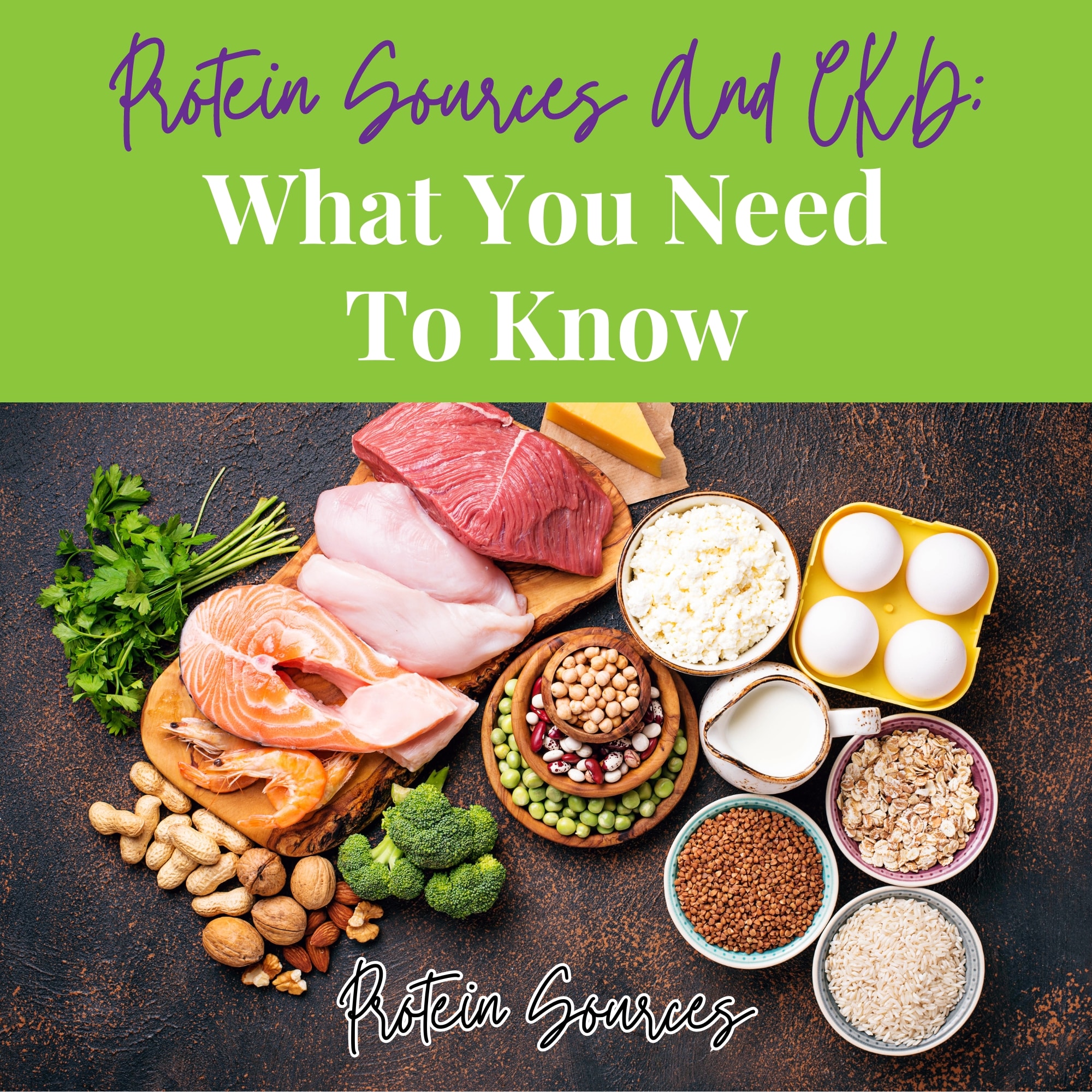
Protein Sources and CKD: What You Need to Know
Navigating the dietary landscape with Chronic Kidney Disease demands a keen understanding of healthy protein sources. In this section, we explore an array of nutrient-rich options that are gentle on compromised kidneys.
These protein sources strike a delicate balance, offering essential amino acids without overburdening the renal system. Discovering these kidney-friendly proteins not only supports overall health but also empowers individuals with CKD to make informed choices for a more fulfilling and nourishing diet.
Healthy Animal Protein Sources
Chronic Kidney Disease patients often need to manage not only their protein intake but also their phosphorus intake, as elevated phosphorus levels can be detrimental those with loss of kidney function. Here are some healthy animal protein sources that consider phosphorus restriction:
- Skinless Chicken or Turkey (Poultry): Chicken and turkey are lean sources of protein with lower phosphorus content compared to red meat. Removing the skin further reduces phosphorus intake.
- Egg Whites: Egg whites are an excellent source of high-quality protein and contain minimal phosphorus. They can be included in various dishes, such as omelets or scrambled eggs.
- Fish: Certain types of fish, like salmon and trout, provide heart-healthy omega-3 fatty acids and are relatively low in phosphorus. However, portion control is essential.
- Lean Cuts of Meat: If red meat is desired, opt for lean cuts like sirloin or tenderloin, which typically contain less phosphorus compared to fattier cuts.
- Dairy Substitutes: Consider dairy alternatives like almond milk or rice milk, which are lower in phosphorus than regular cow's milk. There are even non dairy creamer for dialysis patients.
Balancing protein and phosphorus intake is crucial for CKD patients. Consulting a registered dietitian can provide personalized guidance on incorporating these healthy animal protein sources into a kidney-friendly diet while managing phosphorus levels effectively.
Choosing Kidney-Friendly Proteins
For CKD patients, incorporating plant-based protein options into their diet can be a kidney-friendly and health-conscious choice. Here are some plant protein sources suitable for CKD:
- Legumes: Beans, lentils, and peas are rich in protein and fiber while being low in phosphorus. They are versatile and can be used in soups, salads, and various dishes.
- Tofu: Tofu is a soy-based protein that is low in phosphorus. It can be marinated and grilled, added to stir-fries, or blended into smoothies for a protein boost.
- Tempeh: Another soy-based product, tempeh, is high in protein and lower in phosphorus compared to some other protein sources. It has a nutty flavor and works well in sandwiches and salads.
- Nuts and Seeds: While they contain some phosphorus, nuts and seeds can still be part of a CKD-friendly diet when consumed in moderation. Almonds and chia seeds are good choices for their lower phosphorus content.
- Seitan: Made from wheat gluten, seitan is a high-protein meat substitute. It is low in phosphorus and can be used in place of meat in many recipes.
- Plant-Based Protein Powders: CKD patients can consider plant-based protein powders like pea protein or rice protein to supplement their protein intake without increasing phosphorus levels significantly.
Including these plant-based protein sources in a well-balanced diet can help CKD patients meet their protein needs while managing phosphorus intake, supporting overall health and kidney function. Consulting a dietitian is advisable to create a personalized plan that aligns with individual dietary restrictions and goals. Check out these plant based recipes for kidney disease.
Dangers of Overconsumption or Underconsumption of Protein in CKD Patients
Looking to improve my stage of CKD? Navigating the delicate balance of protein intake in kidney disease presents a multifaceted challenge. This section delves into the critical considerations of protein consumption for those in different stages of renal health.
Whether it's the risks associated with overconsumption in patients with stage 1-3 CKD or the consequences of under consumption in patients with stage 4-5 CKD, understanding the nuances is vital to achieving optimal kidney care and overall well-being.
Protein Overconsumption and Pre-dialysis CKD
Protein overconsumption in Non-Dialysis-Dependent Chronic Kidney Disease can have detrimental consequences on eGFR decline and overall health.
Excessive protein intake leads to an increased production of waste products, including urea and creatinine, which the compromised kidneys struggle to filter and excrete efficiently. This results in a higher workload for the kidneys, potentially accelerating the chronic kidney disease progression.
Furthermore, excessive protein can lead to metabolic derangements, such as increased acid load, which can further harm the kidneys and contribute to the development of conditions like metabolic acidosis.
Elevated protein intake can also exacerbate hypertension, a common comorbidity in CKD, as well as promote the loss of vital minerals like calcium, increasing the risk of bone disorders.
To mitigate these risks, it's essential for pre-dialysis CKD patients to carefully manage their protein intake, ideally with guidance from a registered dietitian, to strike the right balance that supports their nutritional needs while preventing further eGFR decline.
Inadequate Protein for Dialysis Patients
Consuming inadequate protein is a significant concern for dialysis patients and can lead to a host of adverse consequences. Insufficient protein intake can result in malnutrition, muscle wasting, and a weakened immune system, compromising the overall health and well-being of individuals undergoing dialysis.
Muscle wasting is particularly concerning, as it can reduce physical strength and endurance, impair mobility, and diminish the quality of life. Inadequate protein intake can also slow down wound healing and increase vulnerability to infections.
Furthermore, insufficient protein may lead to hypoalbuminemia, a condition characterized by low levels of albumin in the blood. Albumin is a crucial protein that helps maintain blood volume and prevent edema (fluid retention). When albumin levels drop, fluid can accumulate in tissues, causing swelling and potentially affecting heart and lung function.
To avoid these complications, dialysis patients must carefully manage their protein intake, ensuring they meet their prescribed (commonly prescribed medications for CKD) protein goals as per their healthcare provider's guidance and dietary plan. Regular monitoring and adjustments are essential to maintain proper nutrition and health during dialysis treatment.
Sample Meal Plan
Now, let’s discover some sample meal plans that will cater to your protein needs, whether you need to restrict it for Pre-Dialysis Renal Diet or maintain a High-Protein Dialysis Renal Diet.
Sample Meal Plan for Low-Protein Diet (Pre-Dialysis CKD Renal Diet)
- Breakfast:
- Scrambled Egg Whites
- A Slice of White Toast (low-phosphorus)
- Steamed Spinach (limited portion for potassium control)
- Apple Juice (diluted to lower potassium content)
- Lunch:
- Grilled Skinless Chicken Breast (small portion for controlled protein)
- White Rice (low in phosphorus)
- Green Beans (fresh or canned, with reduced sodium)
- Sliced Cucumber Salad (with a low-sodium vinaigrette)
- Snack:
- Carrot Sticks
- Hummus (in moderation for protein and phosphorus)
- Water or Herbal Tea (unsweetened)
- Dinner:
- Baked Salmon (limited portion for protein control)
- Mashed Potatoes (limited portion for potassium control)
- Steamed Asparagus (small portion for potassium control)
- Mixed Berry Compote (sweetened with a sugar substitute)
- Dessert (if needed, sparingly):
- Vanilla Pudding (made with low-phosphorus milk)
This sample meal plan focuses on limiting protein intake while adhering to phosphorus, potassium, and sodium restrictions commonly associated with pre-dialysis renal diets.
It emphasizes whole foods and mindful portion control to promote kidney health and manage chronic kidney disease progression effectively. However, it's crucial to consult a registered dietitian for personalized guidance based on individual dietary needs and CKD stage.
Sample Meal Plan for High-Protein Diet (Dialysis Renal Diet)
- Breakfast:
- Scrambled Eggs (with added egg whites for protein)
- Whole-Grain Toast (low-sodium)
- Sautéed Spinach (limited portion for potassium control)
- Freshly Squeezed Orange Juice (diluted to lower potassium content)
- Lunch:
- Grilled Chicken Breast (generous portion for protein)
- Quinoa (a good source of protein with limited phosphorus)
- Steamed Broccoli (limited portion for potassium control)
- Tossed Salad with Low-Sodium Dressing
- Snack:
- Greek Yogurt (low-phosphorus and high-protein)
- Sliced Strawberries
- Dinner:
- Baked Cod Fish (rich in protein with limited phosphorus)
- Brown Rice (low-phosphorus)
- Sautéed Zucchini and Red Bell Peppers (limited portion for potassium control)
- Steamed Green Beans (limited portion for potassium control)
- Dessert (if needed, sparingly):
- Homemade Gelatin (low-phosphorus and low-sodium)
This sample meal plan is designed to provide ample protein while adhering to phosphorus, potassium, and sodium restrictions commonly associated with a high-protein dialysis renal diet.
Careful food selection and portion control are key to supporting kidney health during dialysis.
Frequently Asked Questions
Yes, for CKD patients, choosing high-quality protein sources is crucial. Protein from lean animal sources like poultry, fish, and egg whites is often preferred due to their complete amino acid profiles and lower waste product generation. Plant-based options like legumes, tofu, and low-potassium nuts can also be beneficial.
These proteins tend to be lower in phosphorus and potassium, which are important considerations for CKD patients. Overall, selecting proteins that provide essential amino acids with minimal waste product production helps support kidney function and manage complications associated with CKD.
Consulting a dietitian for personalized guidance is advisable.
CKD patients can take several steps to avoid overconsuming protein when dining out. Firstly, they should review restaurant menus online in advance to identify suitable low-protein options.
When ordering, they can request smaller portions of protein or share a dish with a friend. It's also wise to inquire about food preparation methods, asking for grilling or steaming instead of frying. Opting for vegetable-based dishes or salads with dressing on the side can help control protein intake.
Lastly, communicating dietary restrictions with restaurant staff is essential to ensure meals align with CKD dietary guidelines. And at the end of the day, there are always apple cinnamon smoothies to help you reach your goals.
CKD patients can prepare kidney-friendly meals like grilled chicken or turkey breast with steamed vegetables, quinoa, or brown rice.
Vegetable stir-fries with tofu, egg whites, or lean cuts of meat are also great options. Omelets with plenty of vegetables (low phosphorus vegetables), egg whites, and limited cheese provide a protein boost. Salmon or cod baked with herbs and lemon is a simple yet nutritious choice.
For a quick snack, Greek yogurt with berries or hummus with carrot sticks is convenient and protein-controlled. These meals and snacks are easy to prepare and align with CKD dietary restrictions on protein intake.
Yes, a CKD patient's protein needs can change over time. The progression of kidney disease, overall health, and treatment methods can all impact protein requirements. It's essential to reassess protein needs regularly, typically during follow-up appointments with a healthcare provider or dietitian.
For many patients, annual assessments may suffice, but more frequent evaluations may be necessary if there are significant changes in kidney function or health status.
Regular monitoring ensures that protein intake remains appropriate and aligned with the patient's specific stage of CKD and individual health goals.
Protein Needs Vary By Stage of Kidney Disease
In conclusion, managing protein intake with CKD isn't easy, but it's vital. Remember, your protein needs change as CKD progresses. In the early stages, you may need more protein, but as the disease advances, a low protein diet is advised. But when dialysis is initiated, it is recommended to start a high-protein diet.
Always choose high-quality sources and balance your intake with your body's needs. Talk to your doctor about your specific needs and whether protein is an issue that you need to worry about with your chronic kidney disease diet. You may need to make some changes and restrict your protein intake to a healthier level for you.





